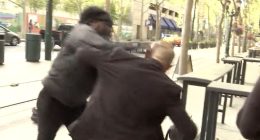
Deaths at American nursing home residents from Covid appear to be at their lowest levels since the coronavirus first swept the United States more than two years ago, according to the most recent data from the Centers for Disease Control and Prevention.
Some 67 residents died during the week ending March 27. While that number could be adjusted in the coming weeks, it mirrors the lows last reached during June 2021 before facilities were hit with the Delta and Omicron variants. Although cases among residents climbed much more sharply in the fall and winter, deaths still reached roughly 1,500 in January before steadily dropping.
But experts say there is little reason for complacency. Nursing home residents remain highly vulnerable to the virus because of their age and underlying medical conditions. While booster shots proved to be protective against severe illness during the latest surge, federal regulators already authorized second booster shots of the Pfizer-BioNTech and Moderna coronavirus vaccines last week. There is also growing concern over a highly contagious subvariant of Omicron, known as BA.2.
Getting the second booster shot to nursing home residents “is a real policy priority,” said David Grabowski, a health policy researcher at Harvard Medical School who studies nursing homes. “We know this is protective.”
While there was a significant push by the federal government and the large pharmacy chains to vaccinate nursing home residents when the initial shots first became available, many facilities were slow to roll out booster shots last fall even as there began to be outbreaks. About 88 percent of residents are fully vaccinated, and about 76 percent have received a booster shot, according to the latest federal data.
Immunizing staff members has been harder, with the federal mandate to require health care workers to be vaccinated facing legal challenges. While 86 percent of staff are fully vaccinated, only 43 percent have received a booster shot. In 13 states, fewer than a third of employees have received the added immunizations.
“We have a lot of nursing homes around the country that lag behind,” said Dr. Grabowski, adding that he was concerned about residents in facilities that serve predominantly people on Medicaid and people of color. “I think there are going to be real issues of equity here,” he said.
The gap between those who received the initial vaccinations and those who receive additional doses could continue to widen, said Brendan Williams, the chief executive of the New Hampshire Health Care Association, a state nursing home trade group. People appear more skeptical over the need for additional shots. “I worry there has been a lot of mixed messages from the federal government,” he said.
While many nursing homes say they will provide the additional doses to their staff and residents, there does not seem to be significant urgency, Dr. Grabowski said. In Connecticut, which this year had issued an executive order mandating booster shots for workers in nursing homes, state health officials were reported to have indicated a similar directive for second boosters was not imminent.
Mr. Williams remains cautious. “Right now, there doesn’t appear to be a crisis,” he said. “There’s not that attention being paid, but things can always change. It’s concerning.”
Source: NYT









